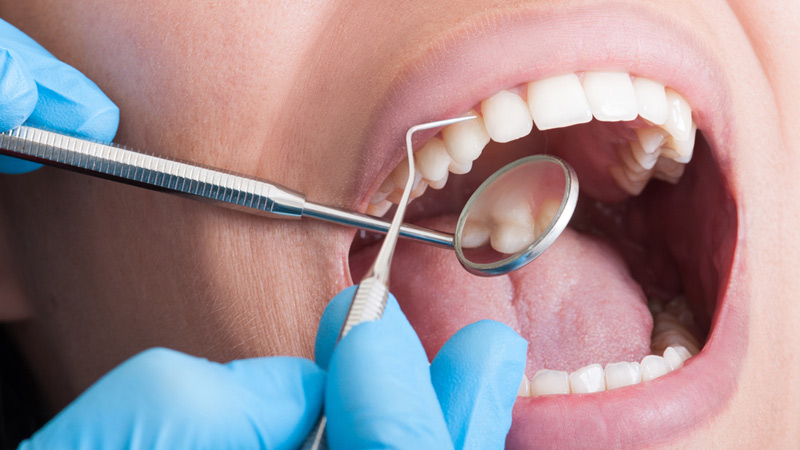Keeping Your Teeth
Health writer A.J. Hostetler on how taking care of your teeth can prevent other health issues, as well.

We regularly care for our bodies from head to tip, yet too often we fail to care for what’s behind our lips.
Boomers may be the first generation to anticipate dying with their teeth. We’ve benefited from one of the country’s biggest public health achievements of the 20th century – clean, fluoridated water – though this year recommendations were lowered to 0.7 milligrams per liter, over concerns of over-fluoridation.
Our parents were among the first workers whose employee benefits included dental insurance, providing many a young boomer trips to the dentist every six months for a thorough cleaning. (As youngsters, we watched the TV advertising wars of Colgate v. Crest, et al., before we joined the cola wars as adults.)
A lack of those cleanings can lead to a mouthful of trouble.
Many boomers, with or without dental coverage, willingly spend their disposable income on bridges and crowns rather than make regular visits to the dentist’s chair for cleanings and a great smile, said Tammy Swecker, associate professor of dental hygiene at Virginia Commonwealth University School of Dentistry.
“Even many among those with dental insurance don’t seek care until it’s painful,” said Dr. Ursula Klostermyer of Advanced Dentistry of Richmond.
“Dental health mirrors a person’s overall health, with known links between dental health and heart disease, diabetes and even Alzheimer’s disease. Dentists and dental hygienists can often spot the first signs of physical illness in the mouth,” Swecker said.
As dental benefits for employees grow scarcer and traditional Medicare doesn’t cover dental care, simple steps can help maintain your dental health:
START WITH A GOOD CLEANING
Regular cleanings will remove the sticky plaque and hardened tartar from your teeth and under your gum line that can otherwise lead to cavities and gum disease. Your dentist should also routinely check for signs of oral cancer.
DRINK TAP WATER
Even as older adults, our teeth need fluoride for protection from bacteria. Most of us live in areas where tap water is fluoridated. Water rinses away sugars deposited by sodas, sweet tea and coffee as well as bits of food that encourage the growth of bacteria.
Tap water can help relieve dry mouth, brought on by disease or hundreds of medications, such as antihistamines, ibuprofen and medications for hypertension and depression.
Keep a water bottle of tap water, rather than (non-fluoridated) bottled water, handy throughout the day. If you plan to eat something sweet, eat it with your meal and then brush, or if you’re out for dinner, discreetly drink, swish and swallow some water to rinse your mouth.
USE THE RIGHT TOOTHBRUSH
Brush at least twice a day, preferably after every meal. Brushing removes the thin film of bacteria that builds up on teeth.
Brush teeth on all sides, using a circular motion and short back-and-forth strokes.
Toothbrushes with large heads prevent you from cleaning back teeth, and hard bristles damage gum tissue. Instead, after rinsing your mouth with water, use a brush with a small head and soft bristles. Massage your teeth at the gum line and gently brush your tongue.
Electric toothbrushes provide a better cleaning and typically come with small, oscillating brushes. They’re easier to grip than manual toothbrushes.
Keep dentures or partials clean of food that can cause stains, bad breath or swollen gums. Brush them daily with a denture care product. Remove them at night and place them in water or a denture-cleaning liquid.
CHECK YOUR TOOTHPASTE
Use a smooth, creamy fluoride toothpaste. Klostermyer says that toothpastes often promoted as anti-tartar buildup typically contain abrasive particles that damage your teeth, much like using steel wool on the family silver.
FLOSS, EVEN IF YOU HATE IT
Few people enjoy flossing, but do so daily, especially just before going to bed, with floss that has round strands. Flossing with a flat, coated surface won’t catch and remove food stuck between teeth left behind by brushing.
FINISH WITH A RINSE
Finish your nightly cleaning routine with an antiseptic mouth rinse, or a fluoridated rinse if your gums have receded. Brushing removes only about a quarter of the bacteria in your mouth.
STOP SMOKING!
In addition to the many other health woes smoking causes, it increases the risk of tooth decay and gum disease. Smokers are significantly more likely to need root canal treatments and to lose their teeth than non-smokers. Smoking also significantly increases the risk of oral cancer. If you notice red or white patches on your gums or tongue, or spot sores that don’t heal within two weeks, see your dentist.
EAT RIGHT – IT MATTERS
Eating healthy foods is great for your dental health. Dairy products with calcium and vitamin D and calcium-fortified juices help promote healthy teeth. Cheese will stick to teeth, creating a small film that protects teeth from acid in foods that cause tooth decay. Crisp fruits and vegetables, such as apples, carrots and celery, help clean plaque from teeth.
A FEW MINUTES EACH DAY spent brushing, flossing and rinsing will help you keep that smile for years to come.
“If you love your body, you take care of it,” Klostermyer said. “You need your teeth to smile, eat and talk.”


